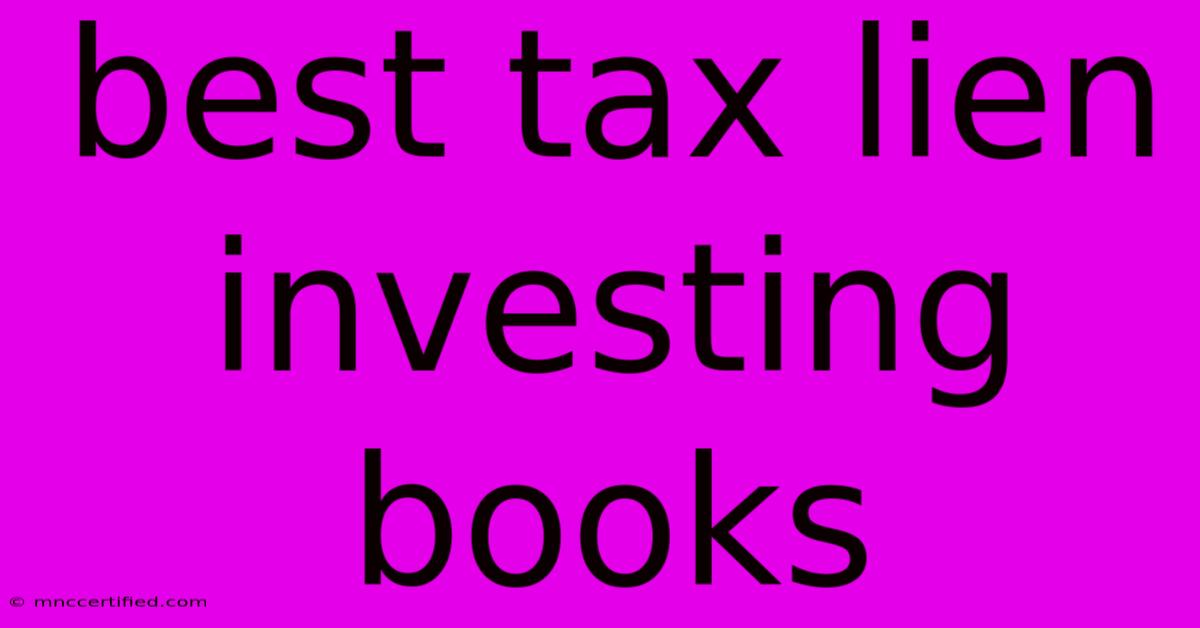Best Tax Lien Investing Books

Table of Contents
Best Tax Lien Investing Books: A Comprehensive Guide for Beginners and Experts
Tax lien investing offers the potential for significant returns, but it's a complex field requiring careful study. Before diving in, arming yourself with the right knowledge is crucial. This article reviews some of the best tax lien investing books available, catering to both beginners seeking a foundational understanding and experienced investors looking to refine their strategies.
Why Invest in Tax Lien Certificates?
Before jumping into the book recommendations, let's briefly touch upon the allure of tax lien investing. Tax liens represent a secured debt on a property, offering investors a potentially high return on investment (ROI) through interest accrued on the unpaid property taxes. This strategy often involves bidding at auctions, purchasing liens, and then collecting interest payments from the homeowner or eventually foreclosing on the property if taxes remain unpaid. High returns, relatively low risk (when done correctly), and the potential for property ownership are key attractions.
However, it's crucial to understand that tax lien investing isn't without its risks. Delays in payments, property condition issues, and legal complexities can impact your investment. Therefore, thorough research and education are paramount.
Top Tax Lien Investing Books: A Curated Selection
This section reviews some of the most highly-regarded books on tax lien investing, categorized for clarity.
For Beginners: Laying the Foundation
-
"Tax Lien Investing: The Definitive Guide to Finding, Buying, and Selling Tax Liens" by Timothy J. McAndrew: Often lauded as a comprehensive introduction, this book provides a step-by-step guide to the entire tax lien investing process, from understanding the basics to navigating the complexities of auctions and foreclosure. It's excellent for beginners who need a solid foundational knowledge. The author's clear and concise writing style makes even complex topics accessible.
-
"Tax Lien Investing For Dummies" by David J. Deibel: Part of the popular "For Dummies" series, this book offers a user-friendly approach to understanding tax lien investing. It simplifies complex terminology and processes, making it an excellent choice for readers new to finance and real estate investment. While less detailed than McAndrew's book, it's a great starting point.
For Intermediate and Advanced Investors: Sharpening Your Skills
-
"The Tax Lien Investing Handbook: How to Profit from Delinquent Property Taxes" by Leonard B. Kirschner: This book provides a more advanced perspective on tax lien investing, delving into strategies for maximizing returns, risk mitigation, and analyzing potential investments. It focuses on practical applications and case studies, which are invaluable for experienced investors.
-
"Tax Deeds: The Ultimate Guide to Finding and Buying Tax Deeds" by Michael J. Kaplan: While not strictly focused on tax liens, tax deeds represent the next step after acquiring a tax lien. This book provides essential information on the process of obtaining a tax deed and navigating the challenges of property ownership acquired through tax foreclosure. It's a vital read for those aiming to take their tax lien investing to the next level.
Beyond the Books: Essential Resources
While books provide valuable foundational knowledge, remember that the tax lien laws vary significantly by state. Therefore, supplementing your reading with state-specific resources is essential. This includes:
- Your State's Tax Assessor's Website: This is your primary source for information on delinquent properties, auction dates, and legal requirements.
- Local Real Estate Attorneys: Consulting with an experienced attorney specializing in real estate and tax liens is highly recommended.
- Tax Lien Investing Forums and Communities: Engaging with other investors online can provide invaluable insights, tips, and networking opportunities.
Conclusion: Invest Wisely, Learn Continuously
Tax lien investing can be a rewarding investment strategy, but it demands meticulous research, careful planning, and a deep understanding of the legal and financial landscape. The books reviewed above provide an excellent starting point, but remember that ongoing learning and adaptation are critical to success in this dynamic field. By combining book knowledge with practical experience and consistent research, you can significantly improve your chances of achieving profitable and sustainable results in tax lien investing.

Thank you for visiting our website wich cover about Best Tax Lien Investing Books. We hope the information provided has been useful to you. Feel free to contact us if you have any questions or need further assistance. See you next time and dont miss to bookmark.
Featured Posts
-
Starbucks Closed Thanksgiving 2024
Nov 29, 2024
-
Michael Burry Invest In Water
Nov 29, 2024
-
Investigation Launched Krugers Assisted Dying Funds
Nov 29, 2024
-
Haise Hospitalized Strasbourg Game Impact
Nov 29, 2024
-
Shelter Insurance Lockwood Mo
Nov 29, 2024